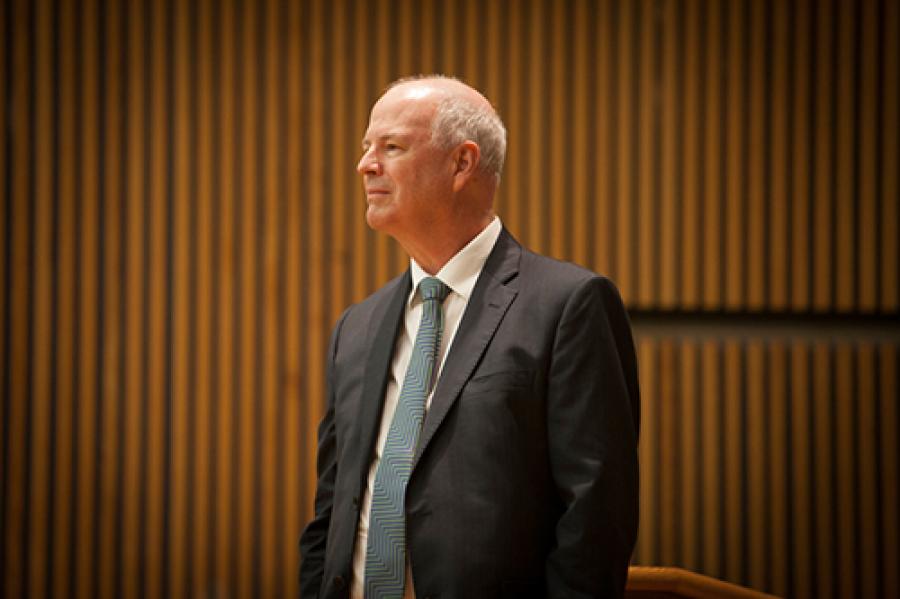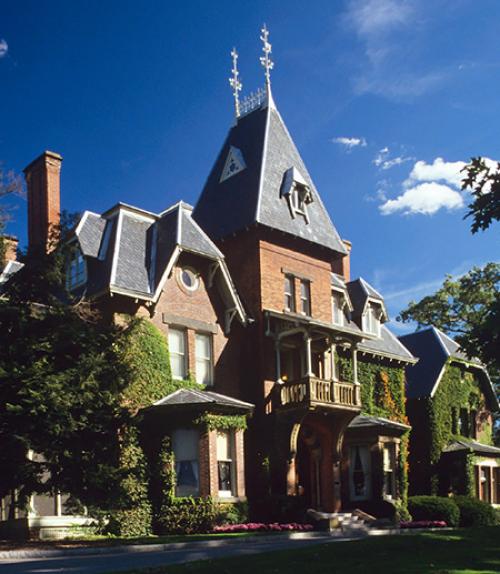For 50 years, the Society for the Humanities has fostered path-breaking scholarship in the humanities. It has sponsored numerous internal grants, workshops and funding opportunities for Cornell faculty and graduate students in the humanities, as well as hosting over 100 annual lectures, workshops, colloquia and conferences organized by Cornell’s distinguished humanities faculty.
“The Society for the Humanities, like the College of Arts & Sciences itself, sits at the nexus of the interdisciplinary dialogue and theoretical reflection that are the humanities,” says Gretchen Ritter, Harold Tanner Dean of Arts & Sciences. “The Society’s 50th anniversary is a good time to celebrate its important work at Cornell.”
“The Society is crucial to work in the humanities on campus, which is why the Society is housed in the president’s house at the symbolic core of Cornell,” says Timothy Murray, Taylor Family Director of the Society for the Humanities and professor of comparative literature and English.
Timothy Murray, Taylor Family Director of the Society for the Humanities
The Society was founded in 1966 in the wake of Cornell’s Centennial celebration, thanks to the efforts of a group of esteemed faculty that included Henry Guerlac, Goldwin Smith Professor of the History of Science; Max Black, Susan Linn Sage Professor of Philosophy; and M.H. Abrams, Class of 1916 Professor.
As the first residential humanities research center in the world, the Society has provided the template at the national and international level for the role of humanities centers within the university.
“The emphasis from the beginning was on interdisciplinarity in the humanities, one of the reasons the Society has been so influential,” says Murray.
More recently, the Society has helped to catalyze a number of national and international initiatives, such as the Central New York Humanities Corridor and the international Consortium of Humanities Centers and Institutes.
Each year, the Society brings together distinguished Visiting Fellows and Cornell Faculty and Graduate Student Fellows to pursue research on a broadly interdisciplinary focal theme. Previous themes include “risk,” “sensation,” and, in 2011-12, “sound.”
Jeremy Braddock, associate professor of English, says that the explorations on sound hosted by the Society had a significant impact. “It felt like a watershed for that field at Cornell and elsewhere,” he says.
This year’s theme is “time,” chosen to mark both Cornell’s Sesquicentennial and the Society’s anniversary. Each Faculty Fellow’s project addresses some aspect of this theme:
- In her “Digital Futures” project, Arnika Fuhrmann, assistant professor of Asian Studies, is investigating the ways in which the temporal properties of digital media expand the dynamics of the political in Southeast and East Asia.
- The book project of Annetta Alexandridis, associate professor of history of art and classics, originates in her work as co-curator of Cornell’s plaster cast collection, and is the story of such collections from a post-colonial, global perspective.
- Associate professor of English Rayna Kalas is working on a book project titled “How to Frame Your Government” that explores the relationship between writing and constitutionalism in the early modern period.
- The research project of Associate Professor Viranjini Munasinghe, anthropology and Asian American Studies explores how the historical rupture defining Caribbean nationalisms reveal formative dynamics not evident in nationalisms of Europe and its former colonies. The recognition that the history Caribbean people share is of relatively recent origin (post 1492) and therefore “knowable” challenges founding logics of nations connecting a people to an immemorial past. The project examines particular moments in colonial and postcolonial Trinidad when the radical difference of the East Indian comes into tension with Afro Caribbean authenticity. .
“We have an incredibly extensive and influential network of alumni, with an impressive record of publications, as well as numerous former fellows who have become senior scholars,” says Murray.
“Because of its success, the Society has been able to develop its own endowments, which have grown more robust over the years,” Murray adds. ““We’ve also been very fortunate to have so much of our programming supported by grants from the Andrew W. Mellon Foundation.”
In collaboration with the New York Council for the Humanities, the Society offers a public humanities fellowship for advanced graduate students. With the Council, the Society also offers community partnership grants that provide support to local humanities groups so they can work with graduate students. One such grant enabled Cornell graduate students to collaborate with Tompkins County Public Library to create a book, “Montage Histories.”
Society grants have supported interdisciplinary research and discussion across campus, such as the media studies reading group, which includes members from the departments of music, English, performing and media arts and comparative literature.
“The Society for the Humanities has been an important hub for media studies,” says Nick Salvato, associate professor and chair of performing and media arts.
Digital humanities, too, has been an active area for the Society. The Society (and Cornell more broadly), has been an innovator in marshalling new digital platforms for artistic curation, artistic expression and theoretical discourse in digital culture. To foster such work, the Society collaborates with the Cornell Library on the Digital Humanities Internship Program, a competitive summer training program on using digital tools in humanities research.
The Society also sponsors Cornell HASTAC (Humanities, Arts, Science, and Technology Advance Collaboratory) Scholars; HASTAC is a consortium of humanists, artists, scientists and engineers from leading nonprofit research institutions.
In addition, the Society co-hosts regular lectures with the Rose Goldsen Archive of New Media Art, which is under the sponsorship of the Division of Rare and Manuscript Collections, and hosts Archive researchers.
Each year, the Society holds three annual lectures: a faculty invitational, a lecture on the future of the humanities, and the Jonathan Culler Theory Lecture. This year, the Future of the Humanities Lecture will be given by William “Bro” Adams, Director of the National Endowment for the Humanities.
Linda B. Glaser is a staff writer for the College of Arts & Sciences





